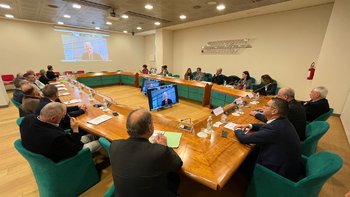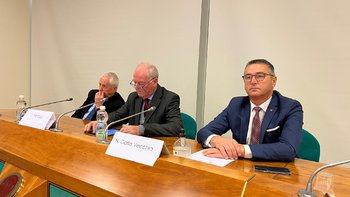Published 1 Dec 2022 - 10.17
Tourism

Press Release of GAL MONTAGNA VICENTINA of 29 November 2022.
CONCLUSION OF THE WORKING TABLES
Needs and proposals to counteract the depopulation of the Vicenza mountains.
Towards the Future Creation of the Local Development Strategy 2023-2027
On Tuesday 29 November 2022, at the Vicenza Chamber of Commerce, the final meeting of the working tables was held, preparatory to the definition of the next strategy of the Montagna Vicentina LAG. The project was financed by the Chamber of Commerce through the funds related to the strategic project "Tourism" based on the increase in the annual fee.
The president of GAL Montagna Vicentina, Dino Panozzo, the delegate for the Province of Vicenza, Gianantonio Gasparini, the president of the Chamber of Commerce, Giorgio Xoccato, and the councilor of the Chamber of Commerce Nerio Dalla Vecchia were present. Luciano Gallo, President of Novia S.r.l., Irene Gasparella, Director of GAL Montagna Vicentina, Valentina Fietta, Project Manager Novia S.r.l., a company in charge of collecting territorial needs, also spoke. All GAL members were represented, but the meeting was open to all stakeholders in the mountain areas of Vicenza: municipalities, third sector, companies and cooperatives. To encourage more widespread participation, a Facebook live broadcast was also organized.
 With this meeting there was the first restitution on the needs defined as priorities by the 4 macro areas of the LAG, an extended territory, of 39 municipalities of the mountain and foothills of Vicenza. These are needs that emerged from a long listening phase that started in May 2022 and focused on the months of October and November with 8 working tables that saw the involvement of local social and economic actors, public and private, called in first person to express an integrated project, and to assess the impact of the actions planned over a ten-year period. In all, there were 127 participants, 37% representatives of public bodies, 29% trade associations, 24% third sector, 10% programmatic agreements. In this sense, coordination with the IPA (Area Programmatic Agreements) and other programming tools present in the area is important.
With this meeting there was the first restitution on the needs defined as priorities by the 4 macro areas of the LAG, an extended territory, of 39 municipalities of the mountain and foothills of Vicenza. These are needs that emerged from a long listening phase that started in May 2022 and focused on the months of October and November with 8 working tables that saw the involvement of local social and economic actors, public and private, called in first person to express an integrated project, and to assess the impact of the actions planned over a ten-year period. In all, there were 127 participants, 37% representatives of public bodies, 29% trade associations, 24% third sector, 10% programmatic agreements. In this sense, coordination with the IPA (Area Programmatic Agreements) and other programming tools present in the area is important.
A total of 55 projects were presented from the territories, expressing the needs of the various areas, from which the prevailing thematic areas were overall, aimed at counteracting the abandonment of mountain territories: the diversification of the local economy, its innovation and integration between subjects, sectors and projects and innovation and social inclusion, with the improvement of services for the population and collective living spaces.
Among the objectives for the future development of the territory stand out the issues of mobility and local transport, personal services that allow a greater balance between work and leisure, childcare services, attention to disabilities, environmental sustainability, enhancement of non-agricultural activities, enhancement of digital services, the exploitation of alternative energies, enhancement of districts and mountain professions, the redevelopment of mountain huts and forest management, the creation or strengthening of specific production chains, the enhancement of area brands and recognized designations.
In addition to the main thematic areas that emerged from the working tables, other aspects of rural development remain important and have been highlighted as needs, namely the enhancement of cultural heritage and natural and landscape resources, in addition to agri-food, with local food systems and supply chains. These projects can also be useful for the planning of the Chamber of Commerce since among the tasks of the Chamber of Commerce there is that of "... enhancement of cultural heritage as well as development and promotion of tourism, in collaboration with the competent bodies and bodies ...".
With the working tables, the strategic role of the LAG for mountain areas was very clear, a subject established on the initiative of the European Union and a key point for a territorial animation that is widely participated, promoted from below with a coordination of interventions that make them more effective in the revaluation of mountain territories.
The importance of activating coordinated and supraterritorial projects emerged, with a concertation between the actions of the various programming instruments that insist on the territory for a greater optimization of resources. Only from continuous dialogue, listening and collaboration between public and private can projects be born destined to a continuity over time and to tangible repercussions for the development of the territory.
All rights reserved.